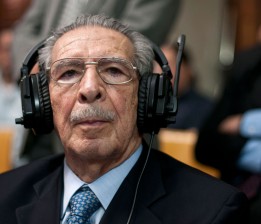Ex-Guatemala president extradited to US

Guatemala’s former dictator Jose Efrain Rios Montt wears headphones as he listens to the verdict in his genocide trial in Guatemala City, Friday, May 10, 2013. AP photo
GUATEMALA CITY — Ex-Guatemalan President Alfonso Portillo was extradited on Friday to the United States to face charges of laundering $70 million in Guatemalan funds through U.S. bank accounts.
The former president was taken from a military hospital where he was recovering from liver surgery and a heart condition and put on a plane, according to his lawyer Mauricio Berreondo. He said the plane was bound for New York after a stop in Miami.
“I blame the government for what could happen to him,” Berreondo said. “Portillo is sick and there are several pending appeals.”
He said one appeal had to do with establishing the state of Portillo’s health.
Portillo, who was Guatemala’s president from 2000-2004, was taken out of the hospital on orders of Interior Secretary Mauricio Lopez Bonilla, Berreondo said.
Article continues after this advertisementAn Associated Press reporter saw a small white jet carrying Portillo dressed in a black sweatshirt take off late morning local time.
Article continues after this advertisement“This decision is an important affirmation of the rule of law and due process in Guatemala,” the U.S. Embassy in Guatemala said in a statement. “We commend the Guatemalan authorities in the strengthening of rule of law and the fight against organized crime and corruption.”
Portillo was turned over to U.S. authorities in the same week that the high court threw out a genocide conviction in another high-profile case against an ex-president, former dictator Efrain Rios Montt. That decision that has been widely questioned and criticized, including in the United States.
Guatemala has been struggling to build a credible justice system, including with the help of a U.N.-sanctioned team of international prosecutors.
For Oscar Vasquez, director of the non-governmental organization Citizen Action, Portillo’s extradition shows the difficulties the country’s justice system is facing.
“As in the case of genocide in Guatemala, the justice system shows signs of chaos, confusion and disorder, given that we no longer know who is right, the state for extraditing him or his defense lawyers,” Vasquez said.
“It seems that we are left to rely on the justice of others,” he added referring to the United States.
In the U.S. case, Portillo allegedly deposited the money in Miami and transferred it to a Paris account in the name of his ex-wife and daughter.
Guatemala’s highest court upheld the extradition last August after it was granted by former President Alvaro Colom as he left office in 2011.
Portillo has called the proceedings a political reprisal by powerful Guatemalan businessmen and the U.S. government for not bending to their interests. He has also said the court agreeing to his extradition constitutes a violation of his human rights.
Upon leaving office in 2004, Portillo fled to Mexico, where he began working as a financial adviser for a construction materials company.
He was extradited from Mexico to Guatemala in 2008 to face embezzlement charges at home.
Portillo was found not guilty in 2011 in Guatemala of charges that he stole $15 million from the country’s Defense Department during his presidency.
In 2010, police captured Portillo at a beach preparing to flee Guatemala by boat, a day after U.S. authorities charged him with laundering money.
While running for president in Guatemala in 1999, Portillo acknowledged he had killed two of his former students while a professor in the Mexican state of Guerrero in 1982.
He said the killings were in self-defense and he fled the state because he could not get a fair trial. The case has since been closed, and he can no longer be charged in those killings.